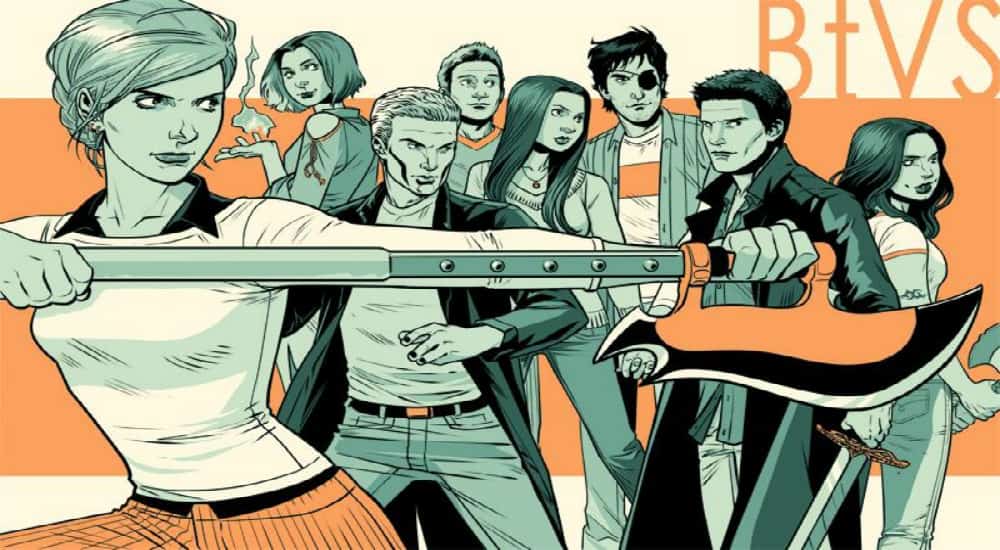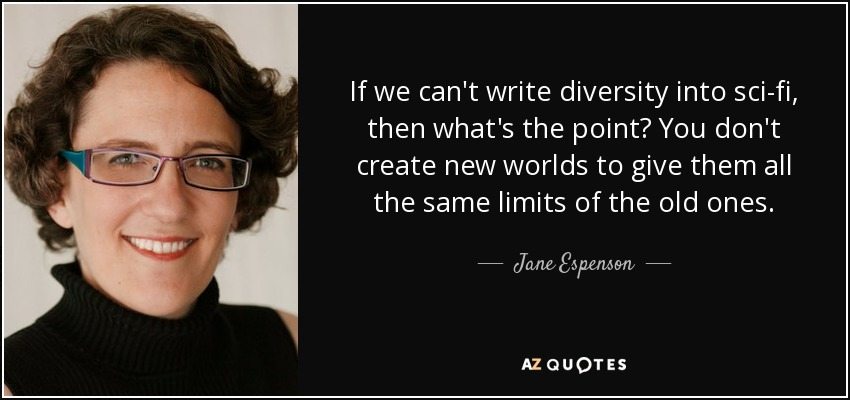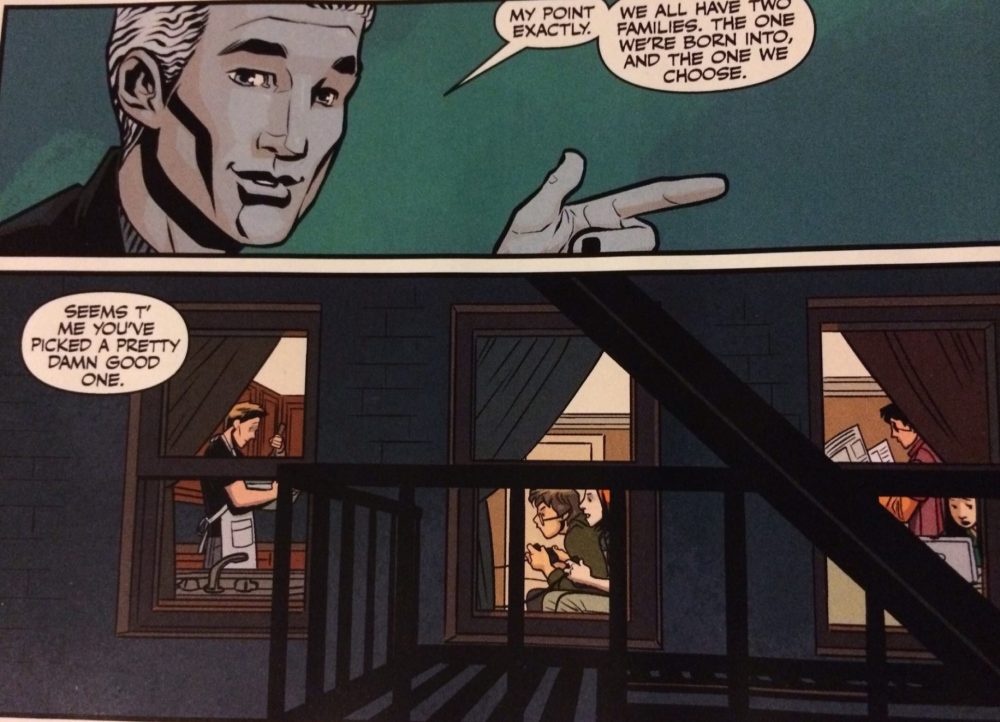
As the entire Whedonverse was rocked this week by Kai Cole’s essay in The Wrap, the time has come to admit that Buffy the Vampire Slayer‘s legacy does not belong to Joss Whedon. Twitter, rightfully, focused on the issue of gaslighting women as fansite Whedonesque shut its reporting, noting donations can be made to charity organizations for complex PTSD, a mental health disorder with which Cole was diagnosed. Whedon fans began mourning the false idol they had worshipped as the man who created a favorite female heroine, while others had their skepticism publicly validated.
Why should anyone care about why Buffy’s legacy does not belong to Joss Whedon?
For a generation of women, Buffy represented the media we didn’t have but wanted. However, as has been noted, “cute blond girl kicking a**” is a trope that needs to go away. So, why should anyone care anyway?
As a continued Buffy fan, I’d like to address the point that while there are things I will always love about Whedon’s writing, particularly the linguistic gymnastics originated in the show, he is not the sole owner of what I love.
Buffy the Vampire Slayer has always been a group effort, and the story currently continues without Whedon’s writing in the Christos Gage run over at Dark Horse. To me, this means that it is possible to pick and choose what we love out of the “Buffyverse” and remove the tumor of Whedon’s ruined reputation as a failed feminist and jerky human being.
Why Buffy’s legacy belongs to Jane Espenson

Looking for feminism in the Buffyverse means remembering that Whedon is not the be all and end all of the show or character. Yes, he came up with the main idea, overarching plots, big bads, and did a whole bunch of stuff that’s not within the modern feminist purview. I used to explain myself as a “Whedon-apologist,” arguing that I would always love Buffy regardless of Whedon because I adore the word usage side of things–still will. However, to truly understand Buffy’s legacy, we need to recognize the women behind the man behind the Slayer.
Let’s be honest, if you’re a diehard Buffy fan, you know the name Jane Espenson. However, it’s possible to love a fandom and not be, dare I say it, a die-hard. This is perfectly OK, but if you don’t know Espenson’s work, get thee to a DVD.
With that in mind, I’m going to direct people to some episodes.
Taking a look at the standalone episodes, “Band Candy” and “Doublemeat Palace,” they represent the best of Buffy’s legacy as a feminist story. In both episodes, Buffy is forced to take on adult roles that show considerable agency. Jane Espenson’s writing of Buffy as a character speaks to my soul. Jane Espenson speaks to my soul. Jane Espenson is life, y’all.
What makes “Band Candy” a feminist episode
First, let’s all take a moment of silence to remember just how amazing Kristine Sutherland was as Joyce Summers in this episode. *dramatic pause* One could argue that sending Joyce’s consciousness back to her teen self who’s chasing after bad-boy-Ripper-Giles is unfeminist. However, as a mom, I adore that Joyce gets to shed the responsibilities placed upon her by social norms of motherhood and adulthood. I love that she gets to basically tell her daughter, “Screw you. I want candy.” That single line encapsulates everything that kind of sucks about being an adult woman. We’re told we need to watch our weight or look a certain way or behave like ladies.
From now on, my feminist call is going to be, “Screw you. I want candy.”
Moreover, from the perspective of Buffy’s growth, this episode is one of the first ones where viewers see her take initiative and plan things on her own. Buffy’s agency in “Band Candy” gives us insight as to how she will be when she needs to be on her own without adults to tell her how to solve the problem. Underneath the funny quips, this episode has a lot of depth and insight showing the type of woman into which Buffy will mature.
What makes “Doublemeat Palace” a feminist episode
Before going further, let’s all say together, “Season 6 is one of the least favorite seasons.” OK, now that we’ve gotten that out of the way, we can move on.
“Doublemeat Palace” was a generally annoying episode in some ways. However, here’s the thing: this is Buffy at her most insecurely, early-twenty-something immature. Everyone has been in that place. Well, at least everyone I know.
It’s also the episode where Buffy admits that her life isn’t what she wants it to be but womans up to do what needs to be done. As an English major, the number of times people asked me, “have you practiced saying ‘do you want fries with that’?” implied the disdainful social attitude towards turning to fast food service as a job. In the same way, Buffy, with all her super powers, is forced to take a low paying job to help support Dawn. She never completed college because of slaying and is looking to create a life for herself now that she is a parent figure.
She takes the crappy job because she does what she needs to do to get things done. We can argue about a lot of things, but if we’re going to look at Buffy’s legacy, we need to look below the monsters and see how they represent women’s varied experiences.
This is a different kind of agency. This is a turning point in Season 6 where Buffy starts to emotionally mature. The fact that fans condemned it speaks more to expectations of female heroism than to what it means to be a hero. Being a hero means doing what needs to be done. Sometimes, we sacrifice our own desires and senses of self for others.
Now that I have matured, “Doublemeat Palace” speaks to my soul. How many times, as a mother, have I sacrificed something for my child? How often do we, in our adult female lives, have to sacrifice some small part of ourselves for our children?
Pairing “Doublemeat Palace” with “Band Candy,” we see that Joyce and Buffy both portray the same feminist struggles. They both have to be mature to care for others while also wanting to have that sweet release of youthful freedom.
And we can’t forget Billy
If you’re a Big Huge Buffy Fan, then you’re reading the comics. If you’re reading the comics, you know that Espenson introduced Billy the gay, male slayer to the book back in 2013. Of course, if you don’t read the comics, you didn’t know this. But, hey, now you do.
Billy was the first gay male character in the Buffyverse and also everything we should all aspire to be. Spoiler: No, he wasn’t touched by the Slayer powers. He just fought really hard and worked to be a slayer. Billy represents the readers who want to be heroes but also added a diversity heretofore not in the Buffyverse.
Jane Espenson’s work in the Buffyverse added depth beyond “having a female writer on the staff.” Looking to the future of the Buffyverse means going beyond Joss Whedon and delving into the varied contributions of the people involved in the show and beyond.
Why Buffy’s legacy belongs to Marti Noxon

Marti Noxon wrote, directed, and acted in Buffy. I mean, granted, she acted by singing in “Once More with Feeling” about getting a parking ticket. But, if you’ve ever seen “OMwF,” then you know her role was probably up there with David Fury’s line, “I got the mustard out.”
Fan favorites by Noxon
Noxon’s first writing credits are the first two episodes of Season 2, “What’s My Line Parts One and Two.” For those who aren’t good at remembering episode titles but are good with plots (Hi! I’m talking about me here!) these are the episodes that introduce Spike, Drusilla, Kendra, and that have Buffy running the career fair.
Noxon was the writer for “The Wish,” which also introduced us to Anya. Vamp Willow has been memorialized in the minds of Buffy fans specifically for being such the opposite of high school Willow.
What else did Noxon do?
Not only did Noxon write and direct some of the most beloved episodes of Buffy, she was also a director, story editor, co-producer, supervising producer, and executive producer on the show. Yes, Joss Whedon was the creator. Joss Whedon’s name is on every episode. I get this. However, an executive producer is the person who often oversees the creative content.
This means that looking to the 2001-2003 seasons, Noxon was in charge of seasons 6 and 7. While a lot of fans hated those seasons, they’re the ones that, as a full fledged adult, I look back to as the ones where Buffy has the most agency as a character. Yes, Season 6 killed off Tara in a horrible, pointless way. That cannot be ignored, and word on the proverbial street has always been this is the reason Benson won’t discuss her Buffy years a lot.
However, if we’re looking for seasons of the television show in which Buffy herself has the most agency? These are them. Buffy makes decisions about taking care of her family. She learns to rely on her friends and her womanhood. She manages to take control of the Slayer power and share it. She makes decisions. She is living without Giles telling her what to do and relying solely on herself and her friends.
Part of the reason fans at the time disliked these seasons was, well, Dawn. The other part was that they were a huge divergence from the traditional Buffy narratives. If we’re looking at the fans in 2001-2003, they were late teens and early twenties disliking watching Buffy deal with a lot of the mundane problems of adulthood.
Having Noxon as the executive producer meant having a woman in charge of watching a woman grow and mature. Buffy is making decisions about sex (unhealthy with Spike), career (that whole random job at Sunnydale High School), and Slaying (choosing to share the Slayer essence). While these decisions may have started with Whedon, we have to recognize that the day-to-day was influenced by Noxon.
While these seasons were problematic from the traditional Buffyverse, looking back on them, they also contained departures from many of the overall agency problems faced when looking at Buffy as a feminist character. In order to truly evaluate Buffy’s legacy, we need to recognize that some of these empowering changes are due to Noxon’s influence as the executive producer.
Why Buffy’s legacy belongs to Christos Gage

If you’re reading the current comics, right about now you’re probably screaming, “AMIRITE FOLKS?” If you’re not reading the current Gage run in the comics, get thee to a comics shop.
First, in the interest of full fan-disclosure, I have to point out that not only do I fangirl epically over Gage’s runs on Angel & Faith and Buffy, but I also recently published a chapter in the anthology At Home in the Whedonverse extolling the virtues of Gage’s work in helping to create a post-feminist heroine. In addition, somewhere in my list of ongoing posts to write that haven’t been written is one about the brilliant social relevancy of the current season.
If you’re not reading the current run, let me give you some insight into why I’m particularly adamant that the Buffy legacy needs to be seen as having nothing to do with Whedon.
How Gage managed to handle the “Seeing Red” dilemma
Christos Gage has done everything right. Everything. For those of us who remember the horrible attempted rape scene in “Seeing Red” that ruined Spike for anyone, Gage managed to do a magnificent job redeeming the characters’ relationship. In order to move their relationship forward in the comics, Gage faces the past head on with a poignant scene between Buffy and Spike.
SPIKE. Slayer, I… I’m sorry. For… well, all of it, really.
BUFFY. Spike, I didn’t mean you were…
SPIKE. No. Let’s not tiptoe around it. When I think of what I did to you, after you ended things between us – What I tried to –
BUFFY. Listen to me. You didn’t have a soul. I can’t hold what that guy did against you any more than I could blame Angel for Angelus spending a hundred years slaughtering nuns. I’m not excusing what you – what he did. But it shouldn’t matter now. You’re a totally different person. In a lot of ways, so am I. I was in a terrible place back then. Willow had just resurrected me. Being pulled out of… heaven, or wherever I was… It was a kind of pain I still can’t put into words. I damn sure couldn’t face it at the time. I couldn’t be mad at my friends. They brought me back because they loved me. So I just hated myself. And did whatever I could to punish myself. To sink as low as I felt.
(Gage 74/1-5-75/1-2)
Gage does a really amazing job of offering readers a way to move from the cognitive dissonance inherent in accepting a relationship between assaulter and assaultee. Buffy is admitting that she used violent, angry sex in a self-destructive way. She admits that she isn’t excusing anything but that the two characters are different. (And, if you’ve been reading the comics, the Now-Spike is so different from even the besouled Show-Spike that it’s like a totally different character.) At no point does Buffy excuse what Spike did, but Gage manages to negotiate a delicate situation in a nuanced way.
How Gage gave Buffy and Willow feminist agency
Moreover, in the current run, Gage has given Buffy a kind of agency that she never had in the show. Looking back to hints in Season 7, where Buffy truly began to be a leader and make decisions, we can see in the comics what was only hinted at in the show. Buffy’s agency in relationships and Slaying make her the heroine that we wanted
In the current season, readers see Buffy standing up to a fictional representation of a Nazi-styled government imprisoning magical beings. In this scenario, as we watch Buffy fight against this regime, we see Buffy as the heroine she was intended to be. She is more than her powers, despite realizing that they are part of her identity. We see Willow heading back to her roots.
One of the most power feminist scenes in the last issue (spoiler alertish?) would be Willow and Buffy discussing how they feel that their powers are what define them. Meanwhile, each ends up reminding the other of the qualities outside of their magical powers that have made them heroines for the last twenty years.
Why we need to look at Buffy‘s legacy outside of Joss Whedon
Whether you still hold dearly to Whedon or have decided that his hypocrisy is too damning, many of us were introduced to fandom through Buffy. Works are products of their times. Looking at Buffy while ignoring the cultural context in which it was created 20 years ago, any female heroine was a godsend.
In 2000, my now-husband then living-in-sin-if-you’re-Catholic-boyfriend purchased an Xbox and the Buffy videogame for me. Buffy was my gateway into modern fandom. I discovered SpoilerFix (now defunct) and fan boards. I discovered a whole new world.
Focusing only on the negatives inherent in Buffy consistently makes me feel as though I should abandon this thing that I love. However, Buffy’s legacy is so much more than a single man. It is a conglomeration of the women (and men! Yes I’m looking at you Doug Petrie of The Defenders) involved during the original run, the women (fangirl waving at Rebekah Isaacs) involved in expanding the universe, and the fans who continue to astound me in their intelligent analysis of the universe.
Buffy changed my life, but not because of Joss Whedon. Buffy‘s legacy needs to be viewed as more than the single man who created the character and reviewed in terms of those whose influences have formed and sustained the character.




I’m astonished that anyone is taking an essay someone’s ex wrote about them as the unvarnished truth. I’m not saying she’s making anything up, but having been through a divorce I can say from experience that your personal view of what the truth of the situation is is probably vastly different than anyone else’s. If I wrote all about how awful my ex was on some giant public media site, and people took it all to heart as easily as they did this, it would ruin her and that just isn’t fair. She isn’t the person I now perceive her to be, maybe. Hell, maybe she’s a monster but I’m not the one to ask. Honestly, anyone who’s marriage has failed feels pretty much how she feels, though most can’t take the time and money to get diagnosed with PTSD because their trust was betrayed. We just deal with it an move the hell on. It’s pathetic that she hasn’t.
While I do think an online essay was probably not the best way to handle the situation, I would question one part of your post. You’re correct when you say “most [people] can’t take the time and money to get diagnosed with PTSA” – but only because it has nothing to do with time OR money. It’s a valid psychological/psychiatric issue and requires a medical diagnosis.
I couldn’t find a direct link to the Diagnostic and Statistical Manual (DSM), but this article elaborates a bit:
https://en.wikipedia.org/wiki/Complex_post-traumatic_stress_disorder
The article itself is interesting, but the part I would specifically highlight is the very first paragraph, which clearly describes this condition as resulting from a relationship where one side holds most or all of the power.
I think this essay may have been written as a final step in Ms. Cole’s treatment for this condition.
With that said, though: The addendum at the end of Ms. Cole’s essay is really vague. I understand Mr. Whedon’s approach (probably based on advice from legal counsel) but what are the “inaccuracies and misrepresentations” that he is disputing?
From my perspective – I think that Whedon used feminism as a marketing tool which worked and created a strong fandom around that. So when his actions don’t match how he represented himself, it becomes an issue. Personally, I’m more annoyed that he used feminism as a marketing tool and a branding method than at him being a jerk.
That said – there are several stories that have floated over the last twenty years that his actions speak louder than his words, and those actions aren’t too feminist.
‘Trust the tale not the teller’ D.H Lawrence.What matters most id ht story of Bufy not who wrote it
I don’t read the comics, but it isn’t true that a character introduced in them is the first gay male character in the series. Andrew is coded as at least bisexual, and there was the bully character who Xander accidentally encouraged to come out of the closet in the second season.
One can advance the light by miles without being perfect in their own private lives. You don’t have to be a perfect saint to do good. In fact that is one thing that is hindering the progressive movement sometimes – abandoning good people just because they are not perfect saints all the time. People fail. That is life. And their failures do not destroy their accomplishments. If you exclude people as soon as they fail once, you soon will run out of people in your movement.
Buffy belongs to Whedon, heart, body and soul. He created it, he made it an immense success. Hell, he made Buffy one of the best shows on TV after Fox butchered his original script for the movie. His shows turned nobodies into television and movie stars. Just because he did something you don’t like and hurt your fee-fees doesn’t change anything about his career and accomplishments. At all.
Yeah, he cheated, maybe. So what? That’s his wife’s problem, no one else’s.
Gaslighting because her article is based on truths and half truths?
That’s precisely why people dislike the feminist label because so many people jump the gun on things like that.
So we shouldn’t pull down the statue of Whedon.
I’m not even aware of what hypocrisy. I love Serenity / Firefly and his other contributions too.
As much as I agree with you, Marti Noxon also wrote one of the stupider things in the Buffy mythos: a moment of pure happiness = orgasm. I mean, I get it on some level–there’s no other physical act that is more intimate than sex, with the possible exception of giving birth, though that’s intimate in an entirely different way–but, come on! Having Angel turn evil right after he and Buffy sleep together is really, really stupid! It also started a really stupid trend where characters have sex with another . . . and then someone dies right after (or something to that effect; you can certainly make the argument that Angel “died” after that scene).
I also thought that killing off Tara was–and I’m about to get into hot water here–a smart move. I’m saying I think it was a good thing Tara was killed, I don’t (I’ve always felt she’s a bit under appreciated), but . . . Tara was much more than just “the lesbian character,” and this was not the first time that a character randomly, senselessly died in the show. I mean, one of the things that the show was known for was randomly killing off characters without preamble. Joyce, Anya, Angel (sort of), even Buffy herself–twice! It fit with some of the more existential themes of the show, and gave Willow one hell of a push to . . . actually do stuff. Season six Willow was honestly a little boring and the show was definitely losing some of its pizz-azz by that point and Willow became a much darker, interesting, varied person. By losing Tara, the show essentially lost the moral center of the Scooby Gang and they had to cope with that. Willow struggled with her own inner darkness for much of season seven, Buffy floundered for a good while with knowing what was right and what was wrong, Xander . . . well he was Xander so yeah; even Giles struggled with doing the right thing.
I’ve never read the comics, but I’ve been meaning to. I know Brian K. Vaughan wrote one of the arcs and so did Jane Espenson and I love both of them. Are they worth reading?